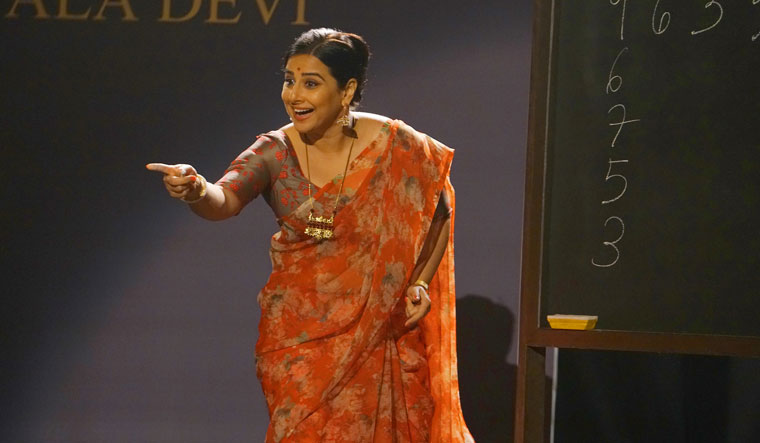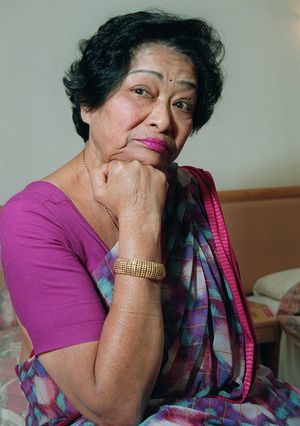Unlike everyone around her who has memories of meeting mathematician Shakuntala Devi when she visited their school or at one of her talks, filmmaker Anu Menon does not have any such recollection. An engineering graduate, Menon had not even read any of her books. But knowledge about Devi, she says, is like one of those old Hindi songs “that you just know”. After directing the critically acclaimed Waiting (2015) and co-directing the first season of Four More Shots Please! (2019), Menon was looking for the story of a woman in maths “because we rarely tell such stories”. The first name that came up was that of Devi. The fact that the mathematician’s daughter, Anupama Banerji, lived in London, where Menon is based, helped. The film Shakuntala Devi premieres on Amazon Prime Video on July 31.
Devi, a math wizard known as the “human computer”, simplified complex mathematical equations for countless students. Her name was included in the Guinness Book of World Records in 1982 for multiplying two 13-digit numbers in just 28 seconds. In the 1970s, Devi’s husband, Paritosh Banerji, an IAS officer, came out as gay. It inspired her to write a book on homosexuality called The World of Homosexuals—an empathetic “inquiry into the lives of a minority of her fellow humans who have lived half-hiding throughout their lives”.
“We had so much information that we had to figure out what was actually going into the film,” says Menon, who did interviews lasting several hours with Banerji. “We got an intimate peep into everything there was to [know about] Shakuntala Devi. We matched [our research] with what Anupama provided us—her memories, anecdotes, and a wealth of photographs.”
During the three years of research into Devi’s life, Menon discovered her zany sense of humour and her zest for life. “When I started out, I did not know she was so gregarious and flamboyant,” says Menon. That is why she could think of no one better than Vidya Balan, who often displays a similar exuberance, to play Devi. “Vidya is equally funny and witty and we felt she could carry off the role really well,” says Menon. It was important for her to contact Balan during the early stages itself because she was not sure if the actor would consent to play the mother of a woman in her 20s. She sounded out Balan in early 2018, and the actor was instantly attracted to the role.
“You have a sense that it was a life well lived,” says Balan, who, too, has a knack with numbers. “She had a wicked sense of humour and was like a complex equation.” The film covers Devi’s life from the age of five to 60-something. Actor Araina plays the young Devi and Balan takes over from the age of 20. It was important for Balan to understand the nuances of her character—where she was at each stage of her life, physically, mentally and emotionally. “When you go through so many stages of a character’s [life], it becomes very challenging and fulfilling,” she says. To prepare for the role, Balan listened to the taped interviews of Anupama and her husband by Menon and co-writer Nayanika Mahtani, interacted with Anupama to understand her mother and watched all the available videos on Devi.
Interestingly, Balan had said in an earlier interaction that she did not know how to act in a biopic and “live the life of a real person” until No One Killed Jessica and The Dirty Picture happened in 2011. The Dirty Picture, inspired by the life of south Indian actor Silk Smitha, not only catapulted Balan into the hall of fame, but was also a watershed moment for women-centric cinema in India. The trick, says the actor, is to capture the essence of the person. You might not look like her, but you can adopt some of her mannerisms. And that is what she has tried doing with her portrayal of Devi. Balan’s multifaceted nature helped her inhabit the character. “After a point, I referred to Vidya as Shakuntala. They became one and the same for me,” says Menon.
Balan’s journey of getting into the skin of the character was slow. “What I knew [initially] of Shakuntala Devi was that she was a human computer,” she says. “Slowly, I started discovering so many layers. At one point, I turned to Anu and asked, ‘Ok tell me, what has she not done?’” Balan says what attracted her was how Devi embraced her flaws and limitations as well as her gifts and her genius. “I think that is what makes her so inspiring,” she says. “That she did not think she was a saint. She thought, ‘Main jaisi hoon great hoon’ (I am great as I am). She wanted to try everything and live every moment like it was her last. So, she wrote books, she was an astrologer, and at some point, she joined politics. She was travelling the world and meeting presidents and prime ministers of various nations.”
One of the striking points in the trailer is when Anupama (played by Sanya Malhotra) accuses her mother of not being like other moms who are selfless and always at the beck and call of their children. Devi, on the other hand, balanced both motherhood and her career, refusing to give one up for the other. “Even if you are not able to personally identify with the character’s predicament, you can draw from what you have seen around,” says Balan. “I have seen this a lot with friends who are working moms, whose children expect them to be only mothers. I think the expectations from a mother are very unfair.”
Although she is not a mother, Balan is no stranger to the complexities of being a wife and a working professional. “Even though I have come a long way, I still think there are times when I feel that maybe I should do some more,” says Balan. She deals with it by having open conversations with husband, film producer Siddharth Roy Kapur.
Playing Devi might just be a defining moment in Balan’s career. The makers, on their part, have left no stone unturned to imbue her character with nuance and authenticity. “This film is not a puff piece, neither is it an ode to Shakuntala Devi,” says Menon. “We have gone into the darker spaces, ready to make it a bit real.”




